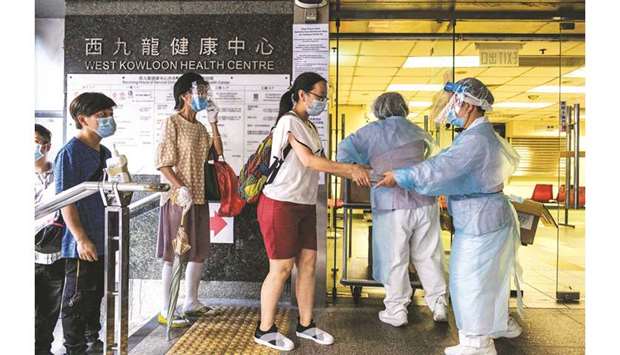Hong Kong’s government could postpone by a year a vote for seats in the city’s legislature scheduled for Sept 6 amid fears of a resurgence in novel coronavirus cases, public broadcaster RTHK reported yesterday.
A postponement would be a blow for the opposition pro-democracy camp, which is aiming to win a historic majority in the city’s assembly given widespread resentment of Beijing’s imposition of a new security law widely criticised by Western countries as eroding citizens’ rights.
The RTHK report cited unidentified sources and did not give any more details. The office of Chief Executive Carrie Lam and the Constitutional and Mainland Affairs Bureau did not immediately respond to a request for comment.
Some 600,000 people voted in unofficial primaries polls for the opposition in Hong Kong this month, sending a younger, more confrontational generation of pro-democracy politicians into the race for the legislature.
One of them, prominent democracy activist Joshua Wong, said he would doubt the veracity of any coronavirus delay. “Using pandemic as an excuse to postpone the election is definitely a lie,” Wong said on Twitter. The Legislative Council, or Legco, election would be the first vote in the former British colony since the introduction of the national security legislation in the semiautonomous city.
The law punishes what China broadly defines as secession, subversion, terrorism and collusion with foreign forces with up to life in prison and sees mainland Chinese security agents operating officially in the city for the first time. Critics of the law say it erodes the freedoms Hong Kong was promised when it was handed back to China by Britain in 1997, while supporters say it would restore stability after a year of often-violent pro-democracy protests in the city.
Britain’s foreign minister, Dominic Raab, told top Chinese diplomat Wang Yi that Britain would be watching the Hong Kong elections closely and stressed that China needed to rebuild trust in the global community, a British Foreign Office spokesman said. Under city laws, the government can postpone elections if the chief executive is of the opinion that the vote “is likely to be obstructed, disrupted, undermined or seriously affected by riot or open violence or any danger to public health or safety”. A new election date, not more than 14 days after the original date, must be announced immediately, according to election laws. But British colonial-era legislation gives the government sweeping powers in case of emergency or public danger. It is not clear if former members of the city assembly, whose terms have expired, could return to the legislature in the event of a postponement for a year. Hong Kong has reported about 3,000 coronavirus cases since January and more than 20 deaths – far lower than in other major cities around the world. But the government has warned of a new surge of infections in the community and has banned dining in restaurants and limited group gatherings to two people.
Rival finance hub Singapore, which has had a larger coronavirus outbreak, held a general election this month. At least 68 countries and territories have delayed national or regional elections due to the coronavirus since February, the International Institute for Democracy and Electoral Assistance said. At least 49 countries and territories have decided to hold national or subnational elections, it said.

Residents are given free Covid-19 coronavirus test kits by workers at a government clinic in the Kowloon-side Sham Shui Po district of Hong Kong.
